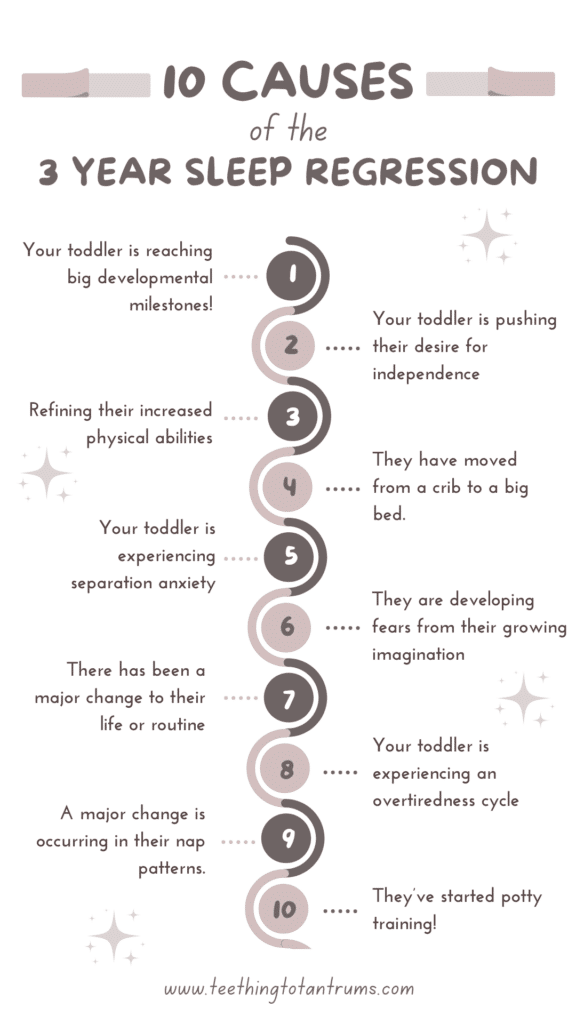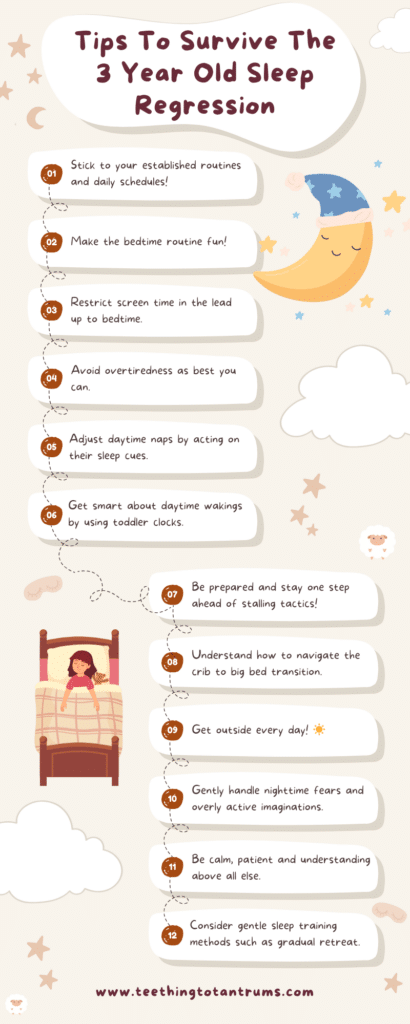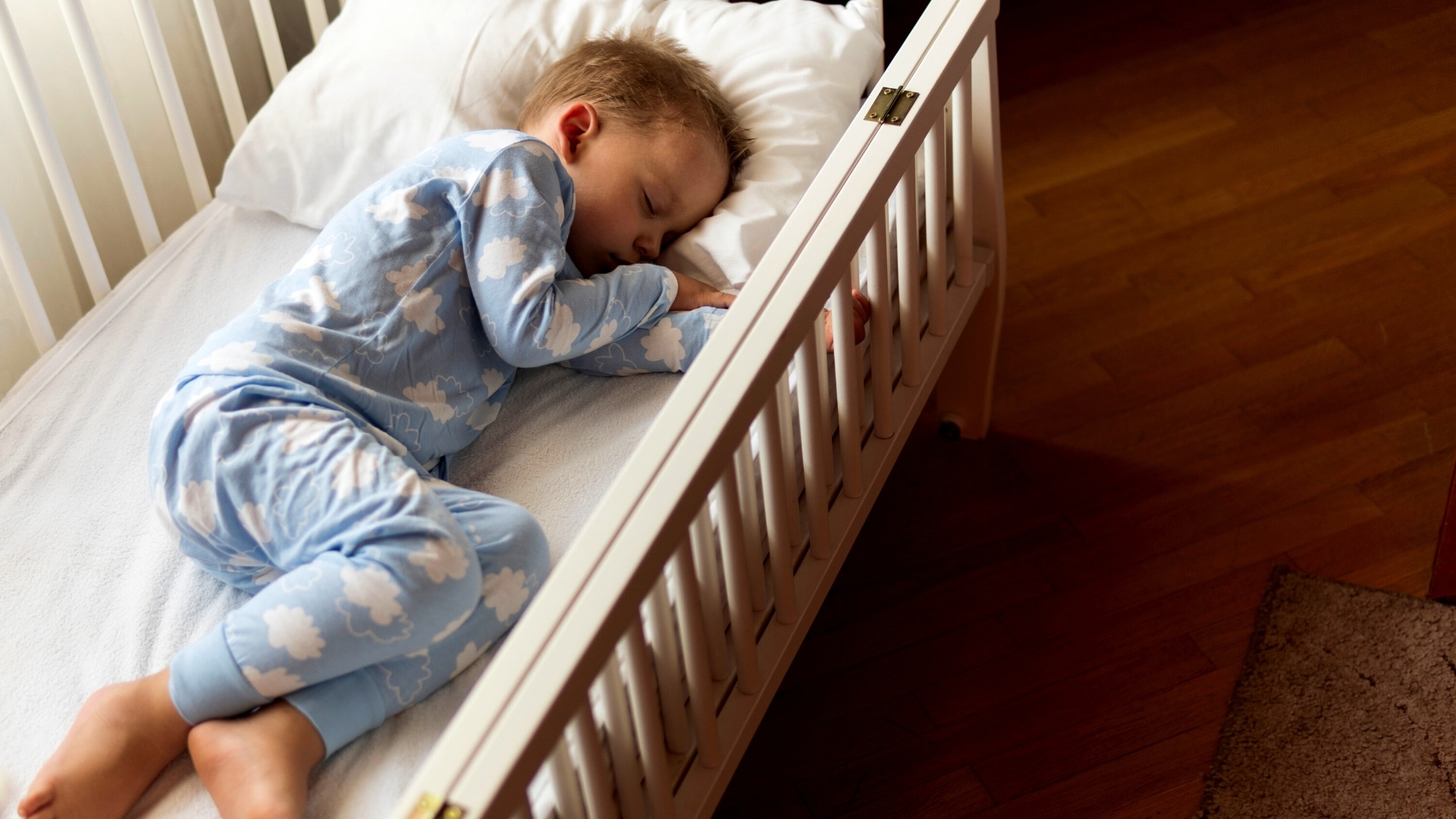Is your child suddenly fighting sleep? Being fussy? Struggling to settle? The 3 year old sleep regression has arrived. Here’s what that means, and what exhausted parents need to know to get through it.
What Is A 3 Year Old Sleep Regression?
A 3 year old sleep regression is a period of time in which your toddler’s sleep patterns get disrupted usually as a result of growth spurts, a change to their environment or changes to their sleep needs. During a regression, children will find it harder to fall asleep, stay asleep and get the proper rest they need.
How Long Does The 3 Year Old Sleep Regression Last?
The 3 year old sleep regression should not last longer than a couple of weeks and certainly not longer than 6 weeks.
If you are consistent in how you handle this sleep regression and are aware of what the causes are, then there is no reason for this regression to be any more than a short blip in your little one’s sleep schedule.
However, knowing the signs of a 3 year old sleep regression and what the causes are will be key in preventing this sleep regression from becoming a bad habit.

3 Year Old Sleep Regression Signs
If you suspect your little one is experiencing a 3 year old sleep regression, here are some of the signs that will confirm your suspicions:
- They Resist Bedtime. With their newfound independence, your 3 year old may start to resist established routines. This is quite normal, but you need to make it clear that certain things are non-negotiable and bedtime resistance is not one of them. Your 3 year old is very likely to try delaying tactics, such as saying they are thirsty or asking for another book to be read to put off going to sleep.
- They Wake More Frequently At Night. During a sleep regression, your toddler will have more night wakings regardless of how they slept throughout the day.
- They Resist Daytime Naps. At 3 years of age, your toddler may be going through a nap transition. They still need 10-13 hours of sleep in a 24-hour period, so what they are not getting at night will need to be topped up with a nap during the day. But during a regression, your toddler may stubbornly refuse to take daytime naps.
- They Wake Early In The Morning. Toddlers like to wake up early and anywhere between 6-8am is quite normal. However, if you’ve been putting them to bed by 8pm and they’re waking up as early as 5-5.30am… it may indicate that they are suffering from a 3 year old sleep regression.
So, if you are nodding your head in agreement whilst reading this list… Then your little one is almost certainly experiencing a sleep regression.
Looking to get your little one to sleep quickly and effortlessly through a healthy nighttime routine? Check out my Bedtime and Nap Cheat Sheet and master the art of making daytime naps and bedtimes as seamless as possible.
A bedtime & nap cheat sheet so good your little one will ask you to put them to bed...
Laura Williams "This is a life saver! I'm so glad I downloaded your bedtime & nap cheat sheet. My little one actually asked me to put him to bed last night! Unbelievable! Thank you so much!"
Click Here For The FREE Cheat Sheet
Causes Of The 3 Year Old Sleep Regression
The reasons your 3 year old is going through a sleep regression are very varied. Not every reason will affect every child, but there are many common causes that you should be aware of:

1. Reaching A Developmental Milestone
Your average 3 year-old has a huge amount going in their brain developmentally and this can often result in them finding it difficult to sleep.
They are experiencing a HUGE leap in their physical developmental abilities too which can easily lead to them being overtired and their expanding language skills will mean they can come up with all sorts of reasons why they should not go to bed.
2. Increased Desire For Independence
3 year-olds will want to do things for themselves, often testing limits of things that are beyond their capabilities and pushing boundaries in their desire to exercise this newfound independence.
As a result, bedtimes can easily become a battleground and your toddler can easily get hyper before bed or have tantrums.
3. Increased Physical Abilities
Your toddler is now more physically able and this can cause all sorts of issues at bedtime.
They may start climbing out of their crib (which is a sure sign they are ready to be moved into a big toddler bed) but this in itself leads to them being able to get out of bed after you have said goodnight…
Causing yet more 3 year old sleep regression dilemmas!
4. Moving From Crib To Bed
Moving your 3 year old from a crib to a bed may well trigger a sleep regression too.
Such a transition needs careful preparation and handling to ensure that it does not disrupt established sleep schedules too much. I will share how I handle this transition later in the article.
5. Separation Anxiety
It is also perfectly normal for your 3 year old to have increased separation anxiety which manifests itself in them not wanting you to leave them at bedtime.
6. Fears And A Growing Imagination
Along with everything else that is going on with your 3 year-old, their imagination will be developing at a rapid rate and this can lead to age-appropriate night time fears such as fear of the dark or monsters under the bed.
These are all very real toddler fears that make it hard for them to settle to sleep and can trigger a 3 year old sleep regression.
7. Change In Family Circumstances And Routine
A major change in family circumstances can also trigger a sleep regression in your 3 year-old.
At this age, they are now so much more aware of what is going on around them that any big change will almost certainly impact their behaviour.
Moving house, the arrival of a new sibling, starting daycare and or a parent returning to work are all major reasons that can trigger a sleep regression at this age.
8. Overtiredness
Your 3 year old is a very busy person and has a huge amount going on physically, emotionally and cognitively.
As a result, they can easily become overtired and an overtired toddler will struggle to get to sleep and stay asleep as their body produces adrenaline and cortisol to keep them going.
If they have started daycare they may easily become more tired on those days too.
9. Change In Nap Schedules
Along with the very real risk of overtiredness, there is the contributing factor to a 3 year old sleep regression that, at this age, many toddlers are transitioning from 2 to 1 nap per day or to not napping at all.
This is not an easy transition and your toddler’s sleep needs and awake times may vary from day to day.
10. Potty Training
Another big developmental milestone for this age group is potty training. While some will sail through this phase, others will struggle which can result in them becoming more cranky and stubborn, especially with sleep issues.
How Much Sleep Do 3 Year Olds Need?
Most 3 year olds need between 10-13 hours of sleep in a 24 hour period. Some will still take a 1-hour nap during the day… but many will not depending on their routine and daily activity.
Tips To Get Through The 3 Year Old Sleep Regression
So now that we know some of the reasons why our toddler may be experiencing a 3 year old sleep regression… how can we help them through this phase?

1. Stick To The Schedule
Having a bedtime routine is always top of my list of parenting tips and it has never been more important than when dealing with sleep regression!
In fact, if you already have a consistent bedtime routine in place then the 3 year old sleep regression will be a lot easier to handle as you have a basic routine to hold on to.
If not, establish one now and stick to it. You will be building healthy sleep habits and strong sleep associations for years to come.
2. Be Creative With The Bedtime Routine
I know this sounds like a contradiction to my first point… And yes, keeping the bedtime routine constant is super important but don’t be afraid to get creative in how you prepare your little one for bed!
Include activities at the end of the day that calm your toddler, such as blowing bubbles at bath time, listening to calming music, doing a puzzle, reading books and cuddling up with their favourite soft toys.
Allowing your toddler to make some choices can also go a long way to helping the bedtime routine run more smoothly as they will feel in control.
Let them choose their pyjamas, what books they are going to read and which toy gets to sleep with them.
These classic 24-piece wooden puzzles are easy to grasp, lift and fit together to create bright scenes of the ocean, being on safari and walking among dinosaurs! Perfect for a quiet afternoon toddler activity, these puzzles will be a wonderful addition to any toy box.
3. Restrict Screen Time
Too much screen time in the lead-up to bedtime has been proven to have a detrimental effect on young children’s ability to fall asleep and stay asleep as the blue light inhibits melatonin production.
So in the lead-up to bedtime, you should avoid screen exposure for at least an hour prior to lights out.
4. Avoid Overtiredness
It is very easy for a 3 year old to get overtired. They are very busy little people who have not developed the ability to know when to slow down or stop yet.
An overtired baby or toddler will not settle well or stay asleep for long periods, so making sure your daily activities don’t tire out your little one too much is quite important and having a clam down corner will help too.
Getting the balance right and avoiding an overtired 3 year old can go a long way in avoiding a 3 year old sleep regression or at the very least… help you to deal with it.
5. Adjust Day Time Napping
Hand in hand with the last point goes adjusting daytime sleep.
Many 3 year olds are transitioning at this stage to having only 1 nap time a day.
In fact, on some days they may not nap at all.
However, I would suggest that even if your toddler does not nap, you should have a quiet time where your toddler can spend time in their crib or bed, looking at books or doing something low energy.
6. Get Smart About Early Morning Waking
While it’s perfectly normal for toddlers to wake up between 6am and 7am… a 5am wake-up is not really ideal!
You can therefore, teach your little one to stay in bed a little longer by using a specially designed colour-coded clock and making sure they have something to play with in their room for when they wake in the morning.
MELLA is the #1 most backed kid's clock and all-in-one Ready to Rise children's sleep trainer designed to keep your kid in bed longer. MELLA is a sleep trainer, alarm clock, sleep sounds machine, night light and nap timer rolled into one adorable package!
Studies show that children do not fully understand the concept of time until around 8 years old, so MELLA uses colours and facial expressions to teach your kid when it's time for bed and when it's okay to wake up. With MELLA, your kid can learn to stay in bed longer, giving you more sleep!
7. Be Prepared
If your toddler uses stall tactics such as always asking for that last drink of water before bedtime or another trip to the bathroom…
Then make sure you stay one step ahead by having that cup of water ready and waiting and that you suggest they have one last toilet visit before lights out.
This will significantly reduce power struggles between you both and will help to build healthy sleep habits.
8. Manage The Crib-To-Bed Transition
Make sure that you prepare your toddler for the crib-to-bed transition. Ensuring that you handle this move properly may avert a sleep regression or at the very least make it short-lived.
Tips to move your toddler to a big bed:
- Establish strong sleep associations (consistent bedtime routine, white noise machine, night light, blackout blinds).
- Try not to move your toddler to a big bed if there are other changes happening at the same time (i.e. going on holiday, the arrival of a sibling, going through a sleep regression) unless you absolutely have to.
- Get your toddler involved in the process. Let them choose new bedding, new PJs, and a new cuddly toy to make their big bed as cosy as possible.
- Gradually increase the time your toddler spends in their new bed. Eg: Let your toddler nap in their big bed, but sleep in their crib.
- Address any fears with patience and compassion.
NOTE: If your little one has moved to a big bed, they may take the opportunity to get out of bed and come and find you rather than going back to sleep, as they did previously. Remain patient and put them back to bed everytime.
9. Get Outside Every Day
Fresh air and natural light are so important to balance out your 3 year old’s circadian rhythm so make sure you get outside every day – even if it’s just for a walk to the park and back.
10. Gently Handle Nighttime Fears
For some 3 year olds, their toddler sleep regression is triggered by age-appropriate fears and concerns.
Fear of the dark or gremlins in the cupboard are perfectly normal for this age as their imagination is starting to develop. So, try to avoid reading stories that may highlight fears and keep bedtime full of happy thoughts.
TOP TIP: Creating a monster spray (an old spray bottle + water + stickers) that you use every night before bed can go a long way to helping alleviate toddler nighttime worries.
11. Be Calm, Understanding And Consistent
The best way to help your little one through a 3 year old sleep regression is to stay calm and appreciate that this is all perfectly normal behaviour.
If they are repeatedly getting out of bed at bedtime or in the night always walk them calmly back to their bed… no matter how many times you have to do it!
No matter what the reason is for your 3-year-old sleep regression, remember that your toddler is NOT being ‘naughty’… they are just experiencing some major changes in their life and need you to help them through it.
Despite the fact that you are feeling unsettled by your toddler’s sleep regression, you will need to hold your resolve and maintain your established routines as much as possible.
12. Consider Sleep Training
In order to get your little one sleep back on track you may have to consider some form of sleep training such as gradual retreat or promised return.
It is important to be consistent in your sleep training and keep your resolve to stop your toddler from developing bad habits that become hard to break.
Take a look at these posts for more help with teaching your toddler to stay in bed.
3 Year Old Sleep Schedule
Your 3 year old’s sleep schedule should now be hopefully well established and will not have changed much over the past 6 months.
Here’s a post to help you establish a healthy and consistent 3 Year Old Sleep Schedule.
The main exception may be that your toddler goes through a nap transition from 2 to 1 naps during this time. If you are struggling with nap transition take a look at this post: How To Navigate The 2 To 1 Nap Transition With Ease
Frequently Asked Questions About The 3 Year Old Sleep Regression
Looking for more information about the 3 year old sleep regression? Check out the most commonly asked questions here.
Why Is My 3 Year Old Suddenly Waking Up At Night?
If your 3 year old is suddenly waking up at night consistently, the main causes will be:
- Overtiredness
- Moving from crib to bed
- Fear of the dark and night terrors.
- Changes in daytime circumstances or routine such as moving house, the arrival of a new sibling or starting daycare.
Do All Toddlers Go Through A 3 Year Old Sleep Regression?
No, not all toddlers will go through a 3 year sleep regression.
In fact, children of any age can go through a sleep regression… It is only the triggers that vary.
So if your 3 year old was napping and going to bed beautifully and then suddenly things are not going so smoothly they have probably a 3 year old sleep regression.
Why Does My 3 Year Old Have A Meltdown At Bedtime?
3 year olds often develop a fear of the dark and separation anxiety which will result in them becoming distressed at bedtime when you try to leave.
In addition, if they have not learned to self-settle they will also become upset when bedtime comes around if you attempt to leave before they have fallen asleep.
These bedtime battles can be reduced by using a night light, listening to audio tapes and helping your little one learn to self-soothe to become more comfortable with being left alone.
If you’re really struggling with this issue, read my post on handling 3 year old bedtime tantrums for a more specific action plan.
What Time Should A 3 Year Old Go To Bed?
I would recommend that your 3 year old goes to bed at 7.30pm every night.
However, it can be a little earlier or later (no later than 8pm) as long as it is at the same time every evening.
How To Stop 3 Year Old Waking Up In Middle Of The Night
All toddlers wake at night just as we do but it is their ability to fall back to sleep alone which will determine whether they wake you up.
While you cannot stop your little one from waking up… you can help them to resettle themselves without needing you.
Use a night light, give them a favourite toy or blanket to sleep with, and address night fears with the use of books such as Orion and the Dark.
Join Orion on an imaginative adventure through the world of the dark! In this beautifully illustrated children's book, author Emma Yarlett explores the concept of fear and how we can overcome it. Follow Orion as he learns to face his fears and discovers the magic and wonder that can be found in the dark. With engaging storytelling and stunning illustrations, "Orion and the Dark" is a must-read for children and parents alike.
When Do I Need To Talk To A Doctor About The 3 Year Old Sleep Regression?
If you are unsure if your little one’s change in sleep routine is due to a 3 year sleep regression, watch for the following signs. If they are present, then you should consult a doctor:
- Abnormal breathing or snoring during sleep
- Weight loss
- Poor appetite
- Major changes in urination or bowel movements
- General lethargy or weakness
If your little one has a persistent fever or a cough which is waking them at night you should also consult a medical practitioner. I would also recommend seeking medical advice if your little one’s sleep issues continue for more than 6 weeks.
Need More Parenting Help?
- Download our FREE Perfect Sleep Cheat Sheet. It’s a free, easy-to-use and proven formula designed for parents of 0-5 year olds to master the art of consistently undisturbed and restful sleep without the yelling, nagging or exhausting long-winded evenings.
- Check out our Parenting Toolbox. You’ll get access to expertly-chosen products that you can guarantee are the best for your little one and your wallet.
- Ready to create the calm, peaceful evenings you deserve? Then checkout our most popular course - The Bedtime Battles Masterclass
sleep at night, sleep disturbances, bright lights, sleep disruptions, bedtime battle, healthy sleep habits, 2-year-old sleep regression, sleep tips, and earlier bedtime.

A bedtime & nap cheat sheet so good your little one will ask you to put them to bed...
Laura Williams "This is a life saver! I'm so glad I downloaded your bedtime & nap cheat sheet. My little one actually asked me to put him to bed last night! Unbelievable! Thank you so much!"
Click Here For The FREE Cheat Sheet





